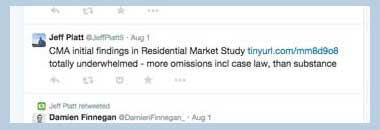 The submission to the Competition and Markets Authority of the Institute of Residential Property Management, which trains block managers, is a blustering dismissal of leaseholder concerns.
The submission to the Competition and Markets Authority of the Institute of Residential Property Management, which trains block managers, is a blustering dismissal of leaseholder concerns.
And it is pretty withering about the CMA’s grasp of the sector.
The suggestion on Twitter by the IRPM CEO Jeff Platt that the CMA’s report serve as kindling for a fire does not demonstrate respect: either to the CMA officials, who we feel have made a sincere effort, or to the many leaseholders who contributed submissions, some of whom have been cheated and ripped off by practitioners in this sector.
There are individuals who have contacted the CMA who have lost tens of thousands of pounds, either through scams or coming off worse against leasehold game-players and their legal professionals in the property tribunal – whose incoherent and unfair cost regime is addressed below.
It would be flippant to make light of practices that have, without exaggeration, blighted lives and left a feeling that the system – leasehold, and its supposed protections – is one-sided and unjust.
One might have expected the head of a training institute whose purported intent is “setting standards” to be sensitive to these matters.
 The full 36pp IRPM submission can be read here.
The full 36pp IRPM submission can be read here.
Broadly speaking, the view of the IRPM can be reduced to the following:

Leaseholders are often extraordinarily ignorant of the property tenure that they have bought.
Their motivation is feckless and short-term, and they cannot be relied upon to spend out to maintain a building properly.
(Unlike, presumably, numerous landlords who have picked up a freehold at auction yet display a statesman-like concern for a buildings’ welfare. It is only the perversity of politics that so many have been named in Parliament in the last couple of years. That many freeholds are owned by offshore companies or dubious charities is also unremarkable, given the value system that prevails in leasehold.)
Furthermore, the IRPM seems to believe that the legal protections for leaseholders are pretty damn generous.
Right to Manage is easily obtained (a curious view, given the many occasions at sector conferences that Mr Platt spends with barrister Justin Bates, who is repeatedly employed to pick faults in these applications. With some success, unfortunately.)
But … contrariwise, leaseholder controlled resident management companies number 80,523 and amount to half the entire leasehold sector, the IRPM says. (This is quite wrong. See below.)
If that were remotely true, you might have thought that the IRPM would be attentive to leaseholder concerns. Not least, because its alumni will be working for leaseholder-controlled properties.
On the contrary, the IRPM blows hard to support the commercial vested interests of the leasehold sector … the house builders, the freeholders and the property management chains (bloated through developers’ contracts, with not one of these companies big through leaseholder preference or choice). And don’t forget the assorted terracotta army of legal and other professionals in the sector, whose livelihood is bound up with leasehold being complex and not working very well.
On balance, we feel that the CMA has done a good job to understand this complex and purposefully obfuscated sector.
Leaseholders must keep their fingers’ crossed that this inquiry into leasehold management – which caught the sector by surprise – is clear-eyed and sees through the blather of vested interests and their noisy toadies.
Here is our detailed analysis of the IRPM’s submission to the CMA.
Leaseholders to blame for problems in the sector
MPs have been repeatedly assured over the past 25 years that the main problem in the leasehold sector is not rapacious landlords or developers or managing agents or lawyers or surveyors, who all profit from the system, but you the leaseholders.
Even though your financial investment is far higher than that of anyone else – including the freehold owners – you just do not understand this form of tenure. You don’t understand your rights or, more important, your obligations. You need educating.
You can drive a car, use a computer and maybe even work as a brain surgeon, but the sector would have the government believe that your failure to understand leasehold is the real problem.
This fantastic con hides the fact that tremendous efforts are taken to ensure that leaseholders remain in the dark … about developers’ dodgy stitch-ups over the management contracts; about the real cost of living in a flat; about the solicitors whose primary loyalty is to the companies that recommend them, not their supposed clients.
Landlords and developers milk the system further through vertical integration, either owning suppliers or taking a cut on contracts.
The question the CMA needs to ask is: cui bono? To whose benefit?
When Parliament stuck its nose into the sector 25 years ago the answers read as though written yesterday. Under Secretary Peter Lloyd said in 1989:
“The aim of the working party was to draw up a voluntary code of practice with the builders and managers of sheltered accommodation, which will ensure that the good management practices of the best-run sheltered housing are adopted by them all.
“The code will focus on four main principles: first, how to develop a soundly planned housing scheme; secondly, deciding what estate management services to provide; thirdly, calculating the service charges to pay for those services; and fourthly, customer information, complaints procedures and arbitration to deal with some of the problems …
“The code will stress the need for adequate pre-purchase information and include model guidance. For example, a model leaflet on consumers’ legal rights. It will ensure that developers do not hand schemes over, once sold, to inexperienced management agencies.
“The latter must be reputable and developers will have to sign a standard agreement with them to ensure they inherit the original obligations that the developer entered into with his buyers. The draft code has gone out for consultation and the final version should be published later in the year.”
Now 25 years later we know the systems are still failing.
Take this for example: there are no circumstances in which a leaseholder can get his or her money back if a managing agent overcharges.
To be clear: we do not mean only a few. We mean absolutely no circumstances in which a leaseholder can recover his or her position in a section 27 case. Why? Because under almost all leases only the landlord is entitled to their costs even if the leaseholders are awarded a 100 per cent of the amount they claim they will never recover their costs.
Now we have the latest voluntary code, called ARMA-Q, which will be implemented in January.
ARMA itself acknowledges that it is inadequate. Like us, and many others, it argues for statutory regulation, which – unwisely – the coalition rejected from the outset.
The sector is entirely guilty of allowing the bad agents landlords and developers to thrive.
These bad agents are not outside ARMA or RICS, as these trade bodies wrongly tell government, but are in many cases at the heart of these organisations.
The codes always seemed designed to leave enough loopholes to allow those bad practices to continue.
But let’s have a look at the submission of the IRPM to the CMA .
IRPM claim 1: The sector is burdened with complexity

Or “huge complexity”, as Jeff Platt Tweeted after listening to the CMA speech at the ARMA conference earlier this month.
No, property management is not hugely complicated.
Complexity should not be an excuse to avoid constraints on the sector, which might avoid practices that no one would justify.
IRPM claim 2: Lack of understanding of obligations
“Lack of understanding of obligations entered into and the role of property managing agents is a frequent cause of dissatisfaction.” The IRPM does a disservice to its own members on this argument.
In Scotland there is no English leasehold law and – as a result – flat owners have more control, there are fewer problems and fewer legal cases. Even Peverel and McCarthy and Stone, which operate in both countries, seem to acknowledge this in conversations with LKP / Campaign against retirement leasehold exploitation.
Yet in Scotland, the sector welcomed the added complexity of the 2011 Factors Act, which followed on from the OFT review which had initially recommended yet more self-regulation. If flat owners can do a decent job of running the show in Scotland then why not in England?
IRPM claim 3: Legal balance exists in leasehold
That the CMA has failed to consider the legal balance that already exists in the leasehold sector.
The property tribunal remains an almost entirely one-sided cost regime in favour of the landlord.
The question is why has the IRPM not pointed out the failings in the current system? Possibly because the IRPM leadership is too wrapped up in it, helping to produce various codes, or because they sit as impartial tribunal members.
In its submission, the IRPM pays no attention to the truth that many aspects of the law do not work as intended, or that key sections have never been fully implemented.
It could be argued the IRPM has misdirected the CMA by suggesting “Section 152 [of the 2002 Commonhold and Leasehold Reform Act] was replaced in 2008 by Sections 303 and Schedule 12 of the Housing and Regeneration Act 2008 (which have also never been enacted).”
Mr Platt must know that the two sections were never analogous and s152 was reviewed by Housing Minister Mark Prisk as recently as the 2013 leasehold round table meeting. One lawyer did suggest considering the 2008 Act instead, but the rest of the room suggested s152 should still be considered.
The IRPM submission glosses over the fact that many aspects of the law have few enforcement powers.
Exactly how many cases have there been for a landlord’s failure to offer the right of first refusal to leaseholders to buy the freehold?
How many cases have forced the disclosure of documents under the 1985 Landlord and Tenant Act?
How many RTM cases have been delayed on the most trivial grounds?
Leaseholders such as pensioners in Elim Court in Plymouth, whose right to manage has been frustrated for three years and will cost thousands of pounds, will be dismayed to read that the IRPM tells the CMA:
“We do not fully understand your comment that RTM is difficult to obtain.”
This is absurd. Numerous right to manage applications have been refused on trivial grounds as the court record demonstrates. The Upper Tribunal has criticised this playing of the legal game – at leaseholders’ expense. Here are a few examples.
The IRPM glosses over even the most basic of issues, such as problems of forming an recognised tenants association. Yet here is an example of a freeholder spending £75,000 to frustrate this at an upmarket Docklands site, and threw in a libel threat against the most prominent leaseholder the evening before the hearing.

IRPM ignores the way freeholders use their lawyers to find defects in the law or to make access to the courts as difficult as possible.
Or, what about large landlords returning time and again to the property tribunal to argue the same issue on different grounds until they eventually win the argument? Why is the IRPM silent over that as well?
IRPM used to teach new property managers (and perhaps still does) to know the rules on lease extension and, particularly, that the freeholder can earn significantly more if the application to extend the lease is delayed until there is less than 80 years left to run.
Given that Mr Platt seems to believe that half the sector is run by leaseholders, shouldn’t an IRPM graduate perhaps consider alerting leaseholders to get a lease extension before the costs go up?
IRPM claim 4: Half the sector is leaseholder controlled
The IPRM says 50 per cent of developments are leaseholder controlled.
The sector has long been happy to work on the assumption that there are about 2,000,000- 2,500,000 privately owned leasehold properties and that ARMA members administer 900,000 of them, or about 50 per cent of the market.
LKP has demonstrated to the satisfaction of the DCLG’s statisticians that these assumptions are entirely wrong. The government now estimates 4.1 million leasehold homes.
The proportion administered by ARMA has shrivelled to a mere 25 per cent, and the proportion that is leaseholder-controlled is therefore likely to be much less than 50 per cent.
As part of our update to our overall figures, LKP will again work with government to obtain a better picture of the number of RTM and RMC units.
IRPM claim 5: Inter-related companies not a bad thing
Vertical integration need not be a negative issue and can provide positive advantages.
Perhaps like the flawed RICS “Transparency in professional fees” report published in 2010, there is the belief that vertical integration is not an issue because the “professionals” of course will be transparent and just pass on the efficiencies such integration would, in theory, bring about.
 In some instances, this may be true, but thousands of leaseholders will know from experience that vertical integration can be highly corrosive and far from transparent.
In some instances, this may be true, but thousands of leaseholders will know from experience that vertical integration can be highly corrosive and far from transparent.
Perhaps it should be compulsory of ARMA board members – and, indeed, members generally – to declare if they happen to also be landlords as well as managing agents?
This is the view of Rob Plumb, CEO of HML Holdings plc, a managing agent and LKP member.
IRPM claim 6: Leasehold law is complex and the CMA has not understood it
The sector is so complex the CMA has not understood the key issues and terms.
While property management need not be complicated, it is unfortunately true that the leasehold sector has been made complicated. This allows lawyers to argue about even the most basic of issues, and laws so convoluted even the specialists lawyers do not understand the whole sector.
Firmness from the property tribunal to stop the legal profession messing around is desperately required.
IRPM claim 7: CMA remedies undermine competitive market
“Your suggested remedies fly in the face of a competitive market,” howls the IRPM.
There may well be stiff competition and dubious deals as managing agents attempt to woo landlords and developers, but that is an entirely different matter from offering competition that provides value for money to leaseholders.
The IRPM’s last word on this subject is probably this:
“A property manager’s primary interaction with leaseholders is to demand service charge monies on behalf of their landlord client”
Only in the RTM and RMC markets (or at least those where the agent is not named in the tripartite lease) is there real competition to win custom from leaseholders who, of course, do the paying.
 IRPM claim 8: RTM members have bullied their neighbours
IRPM claim 8: RTM members have bullied their neighbours
LKP has long been eager for the IRPM to justify its claim to the CMA earlier in the year that it would provide evidence of RTM members bullying their neighbours in order to exercise right to manage.
Although neighbours regularly fall out over just about anything, the only two serious assertions of bullying to join an RTM that LKP is aware of have been made by highly controversial freeholders.
We regarded the claims as preposterous given the business practices of both, as demonstrated in the court record. That does not mean bullying doesn’t happen; it almost certainly does, and pushy neighbours for any cause can be nuisance. But it is not a major, or even secondary issue in leasehold.
LKP has not hesitated to report cases of leaseholders behaving badly, such as RMC director Brian Copsey being jailed for stealing £1 million from the reserve funds. More here.
Mr Platt obviously had second thoughts on this line, which was ridiculed at the LKP Westminster briefing for MPs on right to manage in March.
Are the IRPM’s interests – more importantly, the interests of its alumni who work in the sector – really served by promoting such flimsy stuff?
If these are the sincere views of those in the Institute, it opens the question whether leaseholders should be reassured that their property managers are members of the IRPM, or alarmed.
IRPM claim 9: Statutory regulation of the sector
The sector needs statutory regulation
We finally agree with the IRPM. We fully support the calls from virtually every organisation in the sector. With managing agents controlling hundreds of millions of pounds of leaseholders’ money, this sector needs formal regulation.
Conclusion
At a minimum, the IRPM has over-egged the pudding in its submission to the CMA, and closed an eye to some of the sector’s unacceptable practices.
However, we do support the work to train property managers, for their work to be recognised and valued and for there to be a structure of qualifications.
Property managers should be proud of the job that they do. Many are.
But many are also ashamed of practices in the sector and are working to raise standards. They enthusiastically back ARMA-Q or are accredited members of the Leasehold Knowledge Partnership, which is a charity.
Has the IRPM with this submission to the CMA adequately given voice to a sizeable constituency among its own membership?





 Phillips v Francis decision
Phillips v Francis decision






















This is similar to the dismissive behaviour shown by Peverel Management Services Ltd, trading as Peverel Retirement, when asked in 2008/09, who was our Landlord?
Our Area Manager reported that the Landlord was Meridian Retirement Housing Services Ltd, who had a contract with Peverel Management Services Ltd to be our Managing Agent.
What he failed to inform us was that Meridian Retirement Housing Services Ltd (MRHSL) was part of the Peverel Group, and they were not only our Managing Agent but the Landlord as well
We have been dismissed as trouble makers because we asked for reports to show what was written showing our Warden Call System was FINE in 2005/06 and OBSOLETE in 2006/07.
The usual propaganda from the industry that is trying to make work for itself……Lets face it, IRPM would be out of business if it wasn’t for the continued selling of leasehold properties to the unsuspecting public..